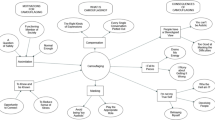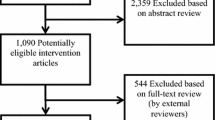Abstract
One hundred forty-nine parents of children with autism spectrum disorders (ASD) completed online questionnaires measuring their beliefs about support groups and ASD, coping style, social support, mood, and use of support groups. Those currently using parent support groups (PSGs) reported using more adaptive coping strategies than both parents who had never used PSGs and parents who had used PSGs in the past. Past PSG users reported that they did not find the groups as beneficial as current users, and parents who had never participated in PSGs reported difficulties with the accessibility of PSGs. Based on the current results, interventions for parents of children with ASD that are focused on meeting the needs identified by participating parents may be most effective.
Similar content being viewed by others
Notes
One participant did not indicate their level of education.
Two participants did not indicate their partner’s level of education and 11 indicated that this question was not applicable.
The data from 6 participants are missing for these questions.
These categories were not mutually exclusive; some parents indicated that their child had both Autism and Autism Spectrum Disorder, likely because the child was given different diagnoses by different professionals.
References
Barnes, L. L. B., Harp, D., & Jung, W. S. (2002). Reliability generalization of scores on the Spielberger state-trait anxiety inventory. Educational and Psychological Measurement, 62, 603–618.
Behr, S. K., Murphy, D. L., & Summers, J. A. (1992). User’s Manual: Kansas Inventory of Parental Perceptions (KIPP). Lawrence: Beach Center on Families and Disability.
Bitsika, V., & Sharpley, C. (1999). An exploratory examination of the effects of support groups on the well-being of parents of children with autism-I: General counselling. Journal of Applied Health Behaviour, 1, 16–22.
Blacher, J., & McIntyre, L. L. (2006). Syndrome specificity and behavioural disorders in young adults with intellectual disability: Cultural differences in family impact. Journal of Intellectual Disability Research, 50, 184–198.
Carver, C. S. (1997). You want to measure coping but your protocol’s too long: Consider the brief COPE. International Journal of Behavioral Medicine, 4, 91–100.
Clifford, T. (2011). Support groups for parents of children with autism spectrum disorders: Predictors and effects of involvement (Doctoral Dissertation). Retrieved from http://hdl.handle.net/1974/6561.
Cohen, S., & Hoberman, H. M. (1983). Positive events and social supports as buffers of life change stress. Journal of Applied Social Psychology, 13, 99–125.
Cook, J. A., Heller, T., & Pickett-Schenk, S. A. (1999). The effect of support group participation on caregiver burden among parents of adult offspring with severe mental illness. Family Relations, 48, 405–410.
Corsello, C., Hus, V., Pickles, A., Risi, S., Cook, E. H, Jr, Leventhal, B. L., et al. (2007). Between a ROC and a hard place: Decision making and making decisions about using the SCQ. Journal of Child Psychology and Psychiatry, 48, 932–940.
Douma, J. C. H., Dekker, M. C., & Koot, H. M. (2006). Supporting parents of youths with intellectual disabilities and psychopathology. Journal of Intellectual Disability Research, 50, 570–581.
Eisenhower, A. S., Baker, B. L., & Blacher, J. (2005). Preschool children with intellectual disability: Syndrome specificity, behaviour problems, and maternal well-being. Journal of Intellectual Disability Research, 49, 657–671.
Faul, F., Erdfelder, E., Lang, A.-G., & Buchner, A. (2007). G*Power 3: A flexible statistical power analysis program for the social, behavioral, and biomedical sciences. Behavior Research Methods, 39, 175–191.
Floyd, F. J., & Gallagher, E. M. (1997). Parental stress, care demands and the use of support services for school-age children with disabilities and behavior problems. Family Relations, 46, 359–371.
Fontana, C. A., Fleischman, A. R., McCarton, C., Meltzer, A., & Ruff, H. (1988). A neonatal preventive intervention study: Issues of recruitment and retention. Journal of Primary Prevention, 9, 164–176.
Grande, G. E., Myers, L. B., & Sutton, S. R. (2006). How do patients who participate in cancer support groups differ from those who do not? Psycho-Oncology, 15, 321–334.
Hastings, R. P. (2002). Parental stress and behaviour problems of children with developmental disability. Journal of Intellectual & Developmental Disability, 27, 149–160.
Katz, D., Koppie, T., Wu, D., Meng, M., Grossfield, G., Sadesky, N., et al. (2002). Sociodemographic characteristics and health related quality of life in men attending prostate cancer support groups. The Journal of Urology, 168, 2092–2096.
Kerr, S. M., & McIntosh, J. B. (2000). Coping when a child has a disability: Exploring the impact of parent-to-parent support. Child: Care, Health and Development, 26, 309–322.
Koroloff, N. M., & Friesen, B. J. (1991). Support groups for parents of children with emotional disorders: A comparison of members and non-members. Community Mental Health Journal, 27, 265–279.
Leventhal, H., Benyamini, Y., Brownlee, S., Diefenbach, M., Leventhal, E. A., Patrick-Miller, L., et al. (1997). Illness representations: Theoretical foundations. In K. J. Petrie & J. A. Weinman (Eds.), Perceptions of health and illness: Current research and applications (pp. 19–45). Amsterdam: Harwood Academic Publishers.
Leventhal, H., Brissette, I., & Leventhal, E. A. (2003). The common-sense model of self-regulation of health and illness. In L. D. Cameron & H. Leventhal (Eds.), The self-regulation of health and illness behaviour (pp. 42–65). New York: Routledge.
Mandell, D. S., & Salzer, M. S. (2007). Who joins support groups among parents of children with autism? Autism, 11, 111–122.
McColl, M. A., & Skinner, H. (1995). Assessing inter- and intrapersonal resources: Social support and coping among adults with a disability. Disability and Rehabilitation, 17, 24–34.
McGovern, R. J., Heyman, E. N., & Resnick, M. I. (2002). An examination of coping style and quality of life in cancer patients who attend a prostate cancer support group. Journal of Psychosocial Oncology, 20(3), 57–68.
Mickelson, K. D. (1997). Seeking social support: Parents in electronic support groups. In S. Kiesler (Ed.), Culture of the internet (pp. 157–178). Mahwah: Lawrence Erlbaum Associates, Publishers.
Miniwatts Marketing Group. (2010). Internet usage and population statistics for North America. Retrieved July 14, 2010, from http://www.internetworldstats.com/stats14.htm.
Plass, A., & Koch, U. (2001). Participation of oncological outpatients in psychosocial support. Psycho-Oncology, 10, 511–520.
Preyde, M., & Ardal, F. (2003). Effectiveness of a parent “buddy” program for mothers of very preterm infants in a neonatal intensive care unit. Canadian Medical Association Journal, 168, 969–973.
Rutter, M., Bailey, A., & Lord, C. (2003). Social Communication Questionnaire. Los Angeles: Western Psychological Services.
Singer, G. H. S., Marquis, J., Powers, L. K., Blanchard, L., Divenere, N., Santelli, B., et al. (1999). A multi-site evaluation of parent to parents programs for parents of children with disabilities. Journal of Early Intervention, 22, 217–229.
Smith, K., Gabard, D., Dale, D., & Drucker, A. (1994). Parental opinions about attending parent support groups. Children’s Health Care, 23, 127–136.
Spielberger, C. D. (1983). Manual for the State-Trait Anxiety Inventory. Palo Alto: Consulting Psychologists Press.
Spielberger, C. D., Ritterband, L. M., Reheiser, E. C., & Brunner, T. M. (2003). The nature and measurement of depression. International Journal of Clinical and Health Psychology, 3, 209–234.
Acknowledgments
This paper was prepared as part of Tessen Clifford’s doctoral dissertation. Special thanks to Dr. Beth Kelley and Dr. Kevin Parker for their support in the development of this project. The first author was supported through a Social Sciences and Humanities Research Council Joseph-Armand Bombardier Canada CGS Doctoral Scholarship [Award # 767-2008-2150] and an Ontario Graduate Scholarship.
Author information
Authors and Affiliations
Corresponding author
Rights and permissions
About this article
Cite this article
Clifford, T., Minnes, P. Who Participates in Support Groups for Parents of Children with Autism Spectrum Disorders? The Role of Beliefs and Coping Style. J Autism Dev Disord 43, 179–187 (2013). https://doi.org/10.1007/s10803-012-1561-5
Published:
Issue Date:
DOI: https://doi.org/10.1007/s10803-012-1561-5




